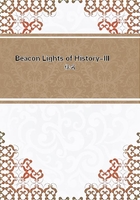
第59章
Becket was no sooner ordained priest and consecrated as archbishop than he changed his habits. He became as austere as Lanfranc. He laid aside his former ostentation. He clothed himself in sackcloth; he mortified his body with fasts and laceration; he associated only with the pious and the learned; he frequented the cloisters and places of meditation; he received into his palace the needy and the miserable; he washed the feet of thirteen beggars every day; he conformed to the standard of piety in his age; he called forth the admiration of his attendants by his devotion to clerical duties. "He was," says James Stephen, "a second Moses entering the tabernacle at the accepted time for the contemplation of his God, and going out from it in order to perform some work of piety to his neighbor. He was like one of God's angels on the ladder, whose top reached the heavens, now descending to lighten the wants of men, now ascending to behold the divine majesty and the splendor of the Heavenly One. His prime councillor was reason, which ruled his passions as a mistress guides her servants. Under her guidance he was conducted to virtue, which, wrapped up in itself, and embracing everything within itself, never looks forward for anything additional."This is the testimony of his biographer, and has not been explained away or denied, although it is probably true that Becket did not purge the corruptions of the Church, or punish the disorders and vices of the clergy, as Hildebrand did. But I only speak of his private character. I admit that he was no reformer. He was simply the high-churchman aiming to secure the ascendency of the spiritual power. Becket is not immortal for his reforms, or his theological attainments, but for his intrepidity, his courage, his devotion to his cause,--a hero, and not a man of progress; a man who fought a fight. It should be the aim of an historian to show for what he was distinguished; to describe his warfare, not to abuse him because he was not a philosopher and reformer. He lived in the twelfth century.
One of the first things which opened the eyes of the King was the resignation of the Chancellor. The King doubtless made him primate of the English hierarchy in order that he might combine both offices. But they were incompatible, unless Becket was willing to be the unscrupulous tool of the King in everything. Of course Henry could not long remain the friend of the man who he thought had duped him. Before a year had passed, his friendship was turned to secret but bitter enmity. Nor was it long before an event occurred,--a small matter,--which brought the King and the Prelate into open collision.
The matter was this: A young nobleman, who held a clerical office, committed a murder. As an ecclesiastic, he was brought before the court of the Bishop of Lincoln, and was sentenced to pay a small fine. But public justice was not satisfied, and the sheriff summoned the canon, who refused to plead before him. The matter was referred to the King, who insisted that the murderer should be tried in the civil court,--that a sacred profession should not screen a man who had committed a crime against society. While the King had, as we think, justice on his side, yet in this matter he interfered with the jurisdiction of the spiritual courts, which had been in force since Constantine. Theodosius and Justinian had confirmed the privilege of the Church, on the ground that the irregularities of a body of men devoted to the offices of religion should be veiled from the common eye; so that ecclesiastics were sometimes protected when they should be punished. But if the ecclesiastical courts had abuses, they were generally presided over by good and wise men,--more learned than the officers of the civil courts, and very popular in the Middle Ages; and justice in them was generally administered. So much were they valued in a dark age, when the clergy were the most learned men of their times, that much business came gradually to be transacted in them which previously had been settled in the civil courts,--as tithes, testaments, breaches of contract, perjuries, and questions pertaining to marriage. But Henry did not like these courts, and was determined to weaken their jurisdiction, and transfer their power to his own courts, in order to strengthen the royal authority. Enlightened jurists and historians in our times here sympathize with Henry. High-Church ecclesiastics defend the jurisdiction of the spiritual courts, since they upheld the power of the Church, so useful in the Middle Ages. The King began the attack where the spiritual courts were weakest,--protection afforded to clergymen accused of crime. So he assembled a council of bishops and barons to meet him at Westminster. The bishops at first were inclined to yield to the King, but Becket gained them over, and would make no concession. He stood up for the privileges of his order. In this he was contending for justice and he defended his Church, at all hazards,--not her doctrines, but her prerogatives. He would present a barrier against royal encroachments, even if they were for the welfare of the realm. He would defend the independence of the clergy, and their power,--perhaps as an offset to royal power. In his rigid defence of the privileges of the clergy we see the churchman, not the statesman;we see the antagonist, not the ally, of the King. Henry was of course enraged. Who can wonder? He was bearded by his former favorite,--by one of his subjects.